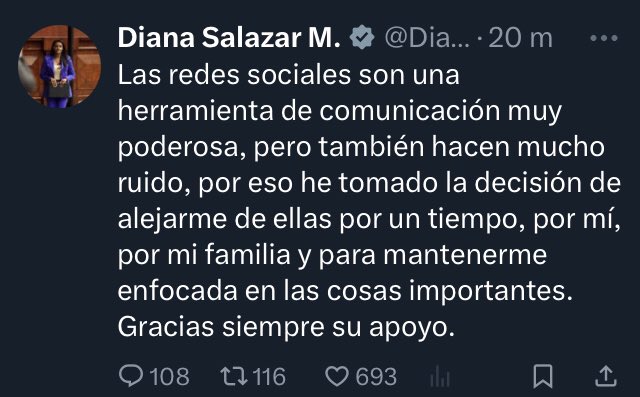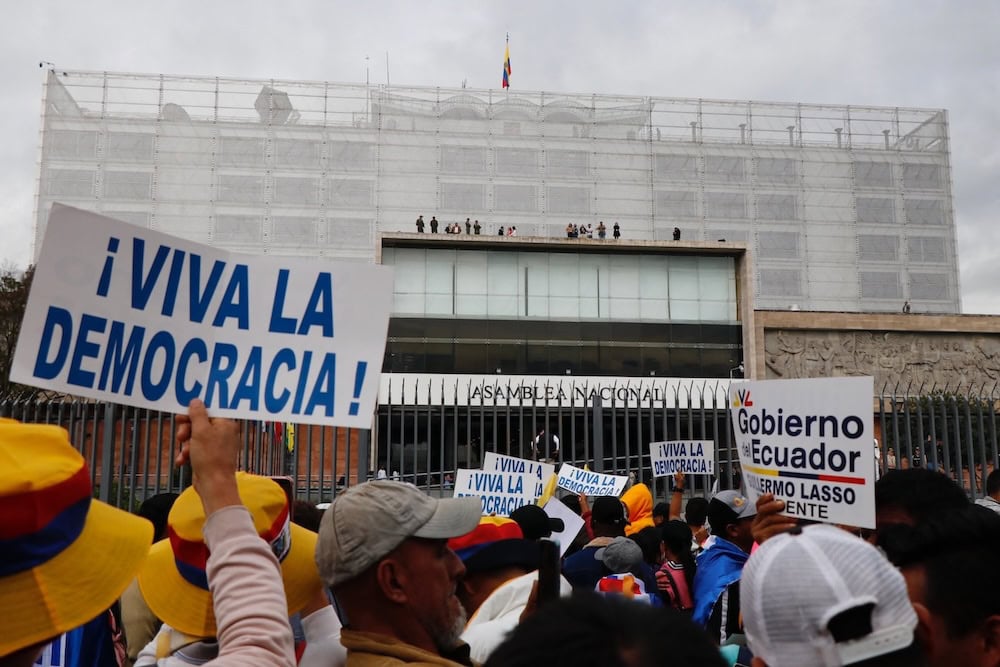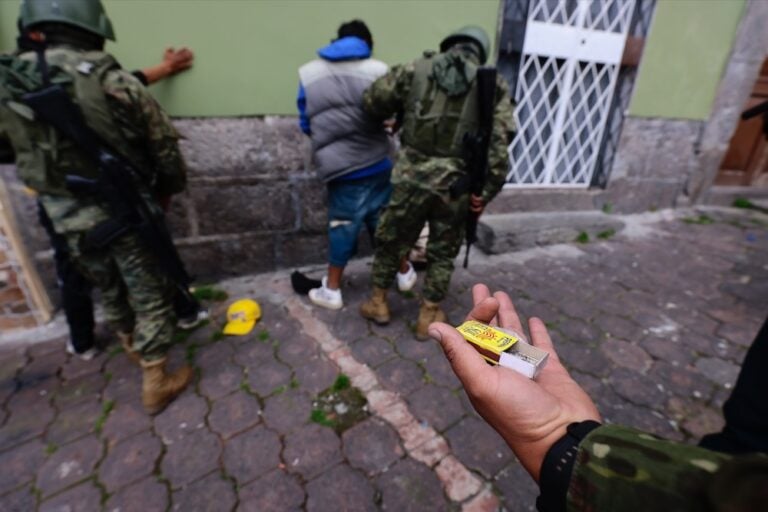Ecuador has become dangerous for journalists investigating corruption cases at the highest levels of state power.
This statement was originally published on globalvoices.org on 24 September 2024.
With tears in their eyes, and grief and sadness on their faces, the Ecuadorian journalist couple Mónica Velásquez and Andersson Boscán announced their departure from the country on the night of September 10, 2024, through a pre-recorded video released to the audience of the digital journalism platform La Posta.
These journalists have conducted several investigations into the alleged corruption of high-level officials in various government entities in Ecuador. However, Andersson Boscán and Luis Vivanco, founders of La Posta, have been criticized for an alleged “lack of journalistic ethics” in some of their actions.
They were forced to seek political asylum in Canada to safeguard their lives and the lives of their young daughters. They thanked international organizations that extended a helping hand amid persecution and threats.
In 2021 and 2023, Fundamedios, an organization that defends freedom of expression, revealed threats to the two journalists. They accused the National Intelligence Directorate of the National Police and the Strategic Intelligence Center for monitoring the journalists’ daily routine and surveilling places frequented by them and their daughters. All the monitoring they reveal is detailed in a report released by the Attorney General’s Office. This document appears to include instructions to “assassinate” them.
However, the police institution involved responded in a statement: “We firmly reject any type of persecution and threat that threatens the life of a citizen (…)”. Likewise, the former commander of the National Police of Ecuador, Fausto Salinas, in an interview, denied that the government of Guillermo Lasso had ordered him to watch journalists.
Investigations by “La Posta” that exposed corruption
In 2020, Andersson Boscán, Mónica Velásquez, and the La Posta team entered Ecuador’s prisons to document the workings of organized crime and criminal gang leaders operating from behind bars.
Their investigation featured the story of a criminal gang leader. The journalists blocked his face for his safety, but, after his murder in October 2022 in a prison massacre, Boscán revealed the identity of the drug trafficking leader in Ecuador he interviewed: Leandro Norero, alias “The Boss.”
The reports were published following an attack that left 14 policemen wounded in 2018. After this attack came various successive prison crises. On social networks, images of prisoners playing football with the head of a decapitated man went viral.
La Posta’s reports documented the lack of public policy implementation in the prison system by the Ministry of Government, led at that time by María Paula Romo. The platform was highly critical of the former minister’s management. In October 2020, Romo was censured and dismissed by the National Assembly for breach of duties for the use and abuse of force by the police during the protests of October 2019.
In January 2023, during the government of Guillermo Lasso, journalists Andersson Boscán and Mónica Velásquez presented a new investigation: “El Gran Padrino” (The Great Godfather). This journalistic investigation was a finalist for the Gabo Awards in the “coverage” category. The journalists also wrote a book.
The investigation revealed audio recordings of private conversations about the alleged capture of the state by narcotrafficking. This journalistic investigation led to the initiation of the impeachment trial in the National Assembly against then-president Guillermo Lasso. The trial sought to impeach and censure the president for alleged corruption.
On May 17, 2023, Lasso was forced to dissolve the National Assembly. Accompanied by his ministerial cabinet, Lasso announced his decision to activate the “muerte cruzada” (“mutual death”) mechanism and denied all accusations against him.
See also: Ecuador revokes visa of critical Cuban–Ecuadorian journalist
Journalistic ethical dilemmas
On December 18, 2023, the Attorney General’s Office published an extensive expert analysis of Leandro Norero’s phone records after his murder as part of an investigation into an alleged corruption scheme involving the judicial, prison, police, and customs systems in connection with drug trafficking.
Among the chat logs are conversations between journalist Andersson Boscán and Norero. The conversations reveal a close and trusting relationship between the journalist and the drug trafficker, who offered to help him “activate eyes and ears” in the public institutions he supposedly controlled. Boscán insists to Norero that he is only interested in “politics” and not in drug smuggling.
Boscán faced criticism and questioning from traditional media, journalists, politicians, social network users, and foundations that defend press freedom in Ecuador. The strong criticism of the journalist’s closeness to sources related to drug trafficking caused indignation amid the violence that Ecuador is experiencing and opened a debate around journalistic ethics.
In five chapters in podcast format, Boscán opens up by defending his journalistic work and justifies the “pampering” relationship with Leandro Norero; his telephone conversation with Adolfo Macías, alias “Fito,” leader of the gang “Los Choneros”; and Nain Massuh, alias “El Turco,” investigated for corruption in the electricity sector. This last investigation revealed to the country the alleged links between drug trafficking and public officials, contracts, and the sale of positions within state-owned companies in the Government of Guillermo Lasso.
A pinned tweet on Andersson Boscán’s X profile states:
But how committed to the social interest is the journalistic practice of the La Posta team? The following are two specific cases of highly questionable journalistic practices.
On July 4, 2021, journalists Andersson Boscán and Luis Vivanco (owners of La Posta) opened a public television program by throwing darts at a photo of the president of the Confederation of Indigenous Nationalities of Ecuador (CONAIE), Leonidas Iza. The violent messages calling the Indigenous leader a “bastard” provoked a barrage of criticism. As a consequence, the government of Lenin Moreno canceled their program and they were forced to apologize.
In another case, Boscán, in his usual morning newscast “Café la Posta,” affirmed that the State Attorney General, Diana Salazar, did not plagiarize 40 percent of her thesis, but “only 6 percent by coincidence,” which morally “would be allowed.” However, an international watchdog formed by renowned academics confirmed the plagiarism of the thesis, a prerequisite to obtain her law degree and apply for the position she currently holds.
‘Social networks make a lot of noise’
Today, the journalists of La Posta denounce the Attorney General of the State Diana Salazar for allegedly persecuting them for exposing the activity of companies supposedly controlled by the Albanian mafia – real estate companies dedicated to purchasing goods with money obtained from drug trafficking. A year after releasing their investigation “El Gran Padrino,” La Posta criticizes the Attorney General’s Office for not requesting the closure of these companies.
In addition, Boscán accuses Diana Salazar of working directly with the Albanian mafia: “You could have your friends take me out.” The journalist warns of having files that would implicate the Attorney General.
Diana Salazar only made a statement to celebrate the decision of the Plenary of the National Assembly to shelve the impeachment proceedings against her. Salazar preferred to close her X (formerly Twitter) account with the argument that: “social networks (…) make a lot of noise.”

Screenshot of the Attorney General of the State’s X tweet before closing her account.
For the time being, the journalists asserted that they will continue their journalistic work from outside Ecuador. This is the second time they have been forced to flee due to death threats against them. In 2023 they also left the country due to threats against their lives.



